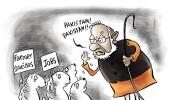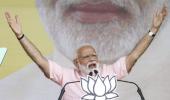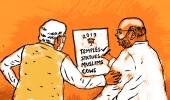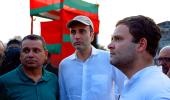'When you look at the content of Modi's speeches, the word 'Modi' is what he pronounces the most by far, which is not a healthy sign.'
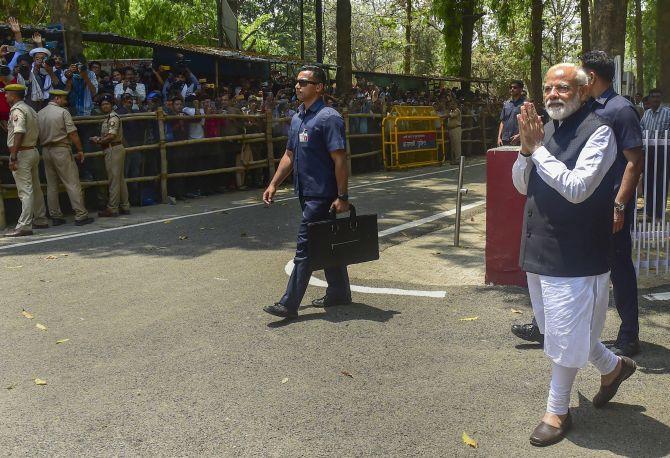
70 per cent of India has finished voting and more than half of the campaign for 2019 is over.
The fate of 413 of 543 elected MPs has already been sealed. The battle now moves to the Hindi heartland where the ruling BJP won 116 of its 282 seats in 2014.
What has been the course of the campaign, the rhetoric, the likely trends and takeaways thus far?
Dr Gilles Verniers, professor of political science at Ashoka University and co-director, Trivedi Centre for Political Data, decodes the election thus far with Rediff.com's Archana Masih.
The 10 takeaways so far:
1. Results are unpredictable as ever. We have no idea about how it is going to translate into seats. It remains an open election.
2. One takeaway is that turnout is not high as it was in 2014.
In the phase in UP for example, it has dropped by 5%.
In Odisha, it has dropped quite substantially.
That gives an indication that there is no wave.
To have a wave is not just a matter of results, but a wave has to be supported by a strong turnout and vote share of first time voters. There is not much excitement among first time voters.
We can say that it has been a wave-less election.
3. There is not much interest in this election compared to 2014.
2014 was a combination of a very strong rejection of the Congress and the rise of Modi as a challenger.
This year, it is whether voters want -- Five more years of Modi OR Try something different. No one really knows what.
4. There are not as many women contesting. In fact, it is a bit lower than 2014. Political parties are responsible for that because they decide the candidates.
There is a fear that giving a ticket to a woman is risky, but we have data that shows the contrary.
The more competitive and more open an election, the lesser the parties are inclined to give many tickets to women.
5. It seems clear that the BJP will have difficulties expanding beyond areas it had a high strike rate.
In states where it is confronted by a strong regional party, the competition is very fierce.
It is not obvious that they are going to make a lot of inroads in Odisha. They will increase vote share in Bengal, but that may not be able to convert into seats, especially in West Bengal.
6. We have not heard much from the RSS so far in this election.
Previous elections they were making statements, this time either they are operating very quietly or are not very visible.
7. If you look at the Hindi belt, the performance of the BJP in successive state elections shows that they have lost ground since 2014.
It makes sense because 2014 was an unusual election and regional parties, even the Congress are more competitive in the states post 2014 and national factors matter less in state elections.
It is not obvious that the BJP maintains its very high vote share which means in this election they have to regain a lot of ground.
They may have lost voters and have to re-win them through the campaign. Whether they have been able to do that we will have to wait till May 23.
8. Balakot is quite far behind now, but it has fed into the national narrative which the BJP has expanded.
Pulwama helps the BJP because it has put national security at the centre piece of their campaign. It has served their purpose and now they can speak about different aspects.
9. In the campaign, the Congress had some momentum when they were talking about their manifesto and NYAY, but now they have seemed to have lost that momentum.
Most of their content is reacting to what the PM and the BJP say. They are now doing a reactive campaign, which is never a good sign.
The BJP's campaign, as expected, only revolves around Modi, but it is always about his personal qualities rather his achievements.
It is quite striking that the ministers are almost absent from the campaign. Most of them actually are not even running.
When you look at the content of Narendra Damodardas Modi's speeches, the word 'Modi' is what he pronounces the most by far, which is not a healthy sign.
The BJP and Modi will try to make this election as much as possible about himself personally rather than his achievements because the numbers are not good.
The economy is not doing well, joblessness has increased.
He is playing the card that it is me or chaos which is the usual refrain of a populist leader.
Charles de Gaulle used to say the same in France in his post World War II campaign. To make a choice between something that is obvious and something that is unknown, which is a very effective rhetorical tool.
But it also makes for a campaign that is devoid of a lot of substance and content.
10.Turnouts in metros has been low as it has been traditionally.
Elections are over in Maharashtra and Odisha.
The outcome in Maharashtra depends region by sub region. The Congress-NCP alliance may do slightly better in southern Maharashtra. Many seats are going to be very closely contested.
In many seats, the Modi factor will determine whether people still vote for Modi over party considerations that still plays a lot into the BJP's favour.
